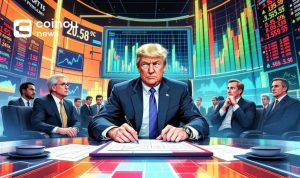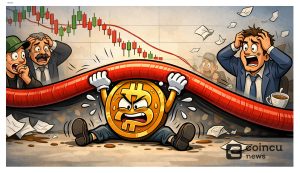- Michael Gapen critiques Trump’s tariff policy, likening it to historical shifts.
- Described as the most aggressive U.S. trade restructure since the 1970s.
- Tariff implication includes potential volatility in trade-sensitive sectors.

Morgan Stanley’s Chief US Economist Michael Gapen compares Trump’s tariff policy announcement to historical economic shifts with unprecedented impact on April 4th.
The tariffs could reshape U.S. tax and trade structures significantly, similar to the magnitude seen in the 1970s.
Trump’s Tariffs Reshape U.S. Trade Structures
Morgan Stanley’s Michael Gapen declared, “Trump’s tariff policy will be the most radical restructuring of the US tax and trade structure since Nixon abandoned the gold standard.” The announcement presented on Wednesday exceeded Gapen’s expectations. Comparing it to the gold standard change, Gapen emphasized its scale.
The announced tariffs aim to alter the US trade framework significantly. The move is seen as an implicit tax on imports, increasing costs for domestic consumers. “The tariff policy could significantly disrupt consumption patterns, acting as an implicit tax on imports and raising costs for consumers,” according to Michael Gapen.
While reactions were mixed, some sectors already showed volatility. Industrials and commodities might face immediate changes. Morgan Stanley shared Gapen’s comments, noting potential for capital reallocations toward domestically focused assets. For more details on broader economic forecasts, visit the Fed Interest Rate Outlook for 2025.
Historical Trade Policy Shifts and Long-term Effects
Gapen’s comparison to Nixon’s gold standard removal highlights a historic shift’s significance, indicating possible long-term supply chain diversification similar to past trade escalations.
Gapen’s analysis includes looking back at events like the 2018-2019 U.S.-China trade war, characterized by market corrections and shifts in supply chains. Experts suggest observing historical patterns to anticipate potential market movements.
Financial implications are ongoing discussions, yet past events like Nixon’s changes sparked notable industry shifts, suggesting potential market revaluation. Economists like Gapen stress monitoring broader market impacts on investments and asset reallocation. Gapen emphasized that “the announced tariffs far exceeded his expectations in terms of scope and impact.”
You can find more about Michael Gapen’s professional insights through his contact information.























